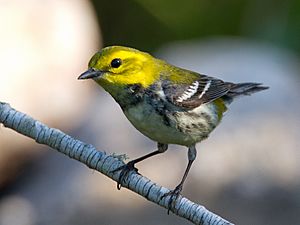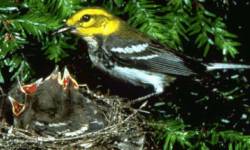Black-throated green warbler facts for kids
Quick facts for kids Black-throated green warbler |
|
|---|---|
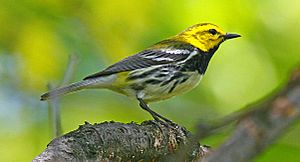 |
|
| Conservation status | |
| Scientific classification | |
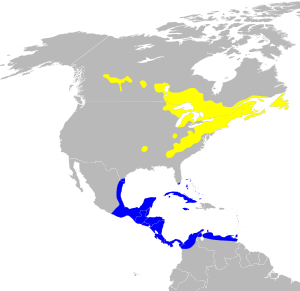 |
|
| Range of S. virens Breeding range Wintering range | |
| Synonyms | |
|
Dendroica virens |
The black-throated green warbler (Setophaga virens) is a small songbird of the New World warbler family.
Description
It has an olive-green crown, a yellow face with olive markings, a thin pointed bill, white wing bars, an olive-green back and pale underparts with black streaks on the flanks. Adult males have a black throat and upper breast; females have a pale throat and black markings on their breast.
Measurements:
- Length: 4.3-4.7 in (11-12 cm)
- Weight: 0.3-0.4 oz (7-11 g)
- Wingspan: 6.7-7.9 in (17-20 cm)
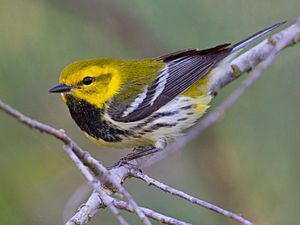
Habitat and distribution
The breeding habitat of the black-throated green warbler is coniferous and mixed forests in eastern North America and western Canada and cypress swamps on the southern Atlantic coast. These birds' nests are open cups, which are usually situated close to the trunk of a tree.
These birds migrate to Mexico, Central America, the West Indies and southern Florida. One destination is to the Petenes mangroves of the Yucatán. Some birds straggle as far as South America, with the southernmost couple of records coming from Ecuador.
Behavior
Black-throated green warblers forage actively in vegetation, and they sometimes hover (gleaning), or catch insects in flight (hawking). Insects are the main constituents of these birds' diets, although berries will occasionally be consumed.
The song of this bird is a buzzed zee-zee-zee-zooo-zeet or zoo-zee-zoo-zoo-zeet. The call is a sharp tsip.
This bird is vulnerable to nest parasitism by the brown-headed cowbird.
See also
 In Spanish: Reinita dorsiverde para niños
In Spanish: Reinita dorsiverde para niños



